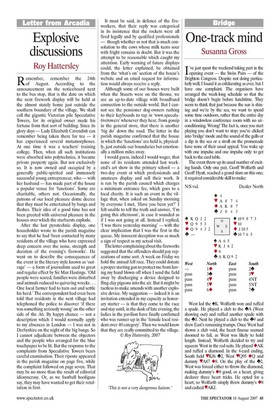Explosive discussions
Roy Hattersley Remember, remember the 24th of August. According to the announcement on the noticeboard next to the bus stop, that is the date on which the next firework display will be held at the almost stately home just outside the southern boundary of the village. We shall call the gigantic Victorian pile Speculative Towers, for its original owner made his fortune from that sort of building. Since its glory days — Lady Elizabeth Cavendish can remember being taken there for tea — it has experienced several metamorphoses. At one time it was a teachers' training college. Then, when all such institutions were absorbed into polytechnics, it became private property again. But not exclusively so. It is now owned and occupied by a generally public-spirited and immensely successful young entrepreneur, who — with her husband — has made part of the house a popular venue for `functions'. Some are charitable, others not. Occasionally, the patrons of our local pleasure dome decree that they must be entertained by bangs and flashes. Their idea of a good time has not been greeted with universal pleasure in the houses over which the starbursts explode.
After the last pyrotechnic display, one householder wrote to the parish magazine to say that he had 'been contacted by many residents of the village who have expressed deep concern over the noise, strength and duration of the evening's fireworks'. He went on to describe the consequences of the event in the literary style known as 'outrage' — a form of journalism used to great and regular effect by Sir Max Hastings. 'Old people were scared, families were disturbed and animals reduced to quivering wrecks ... One local farmer had to turn out and settle his herd.' The correspondent had even been told that residents in the next village had telephoned the police to discover 'if there was something seriously wrong' on the other side of the A6. By happy chance — not a description which I would normally apply to my absences in London — I was not in Derbyshire on the night of the big bangs. So I cannot adjudicate between the objectors and the people who arranged for the blue touchpaper to be lit. But the response to the complaints from Speculative Towers bears careful examination. Their riposte appeared in the parish magazine on page five, while the complaint followed on page seven. That may be no more than the result of editorial idiosyncrasy. Or, as we football hooligans say, they may have wanted to get their retaliation in first.
It must be said, in defence of the fireworkers, that their reply was categorical in its insistence that the rockets were all fired legally and by qualified professionals — though whether or not that is much consolation to the cows whose milk turns sour with fright remains in doubt. But it was the attempt to be reasonable which caught my attention. Early warning of future displays could, the letter explained, be obtained from the 'what's on' section of the house's website and an email request for information would always receive a reply.
Although some of our houses were built when the Stuarts were on the throne, we are an up-to-date village with broadband connection to the outside world. But I cannot see the pensioner dog-owners rushing to their keyboards to tap in `www.speculativetowers' whenever they hear, from gossip in the general store, that there is another 'big do' down the road. The letter in the parish magazine confirmed that the house in which the `functions' are held is, physically, just outside our boundaries but emotionally a million miles away.
I would guess, indeed I would wager, that none of its residents attended last weekend's art show in the primary school — a two-day event at which professionals and amateurs display and sell their work. It is run by the parish council which charges a minimum entrance fee, which goes to a local charity. It is such an event in the village that, when asked on Sunday morning by everyone I met, 'Have you been yet?' I felt unable to tell the truth and answer, 'I'm going this afternoon', in case it sounded as if I was not going at all. Instead I replied, 'I was there yesterday morning' — with the clear implication that I was the first in the queue. My innocent deception was as much a sign of respect as my actual visit.
The letter complaining about the fireworks suggested that the offenders should pay reparations of some sort. A week on Friday we hold the annual fell race. They could donate a proper starting gun to protect me from having my hand blown off when I send the field away by discharging a device designed to fling clay pigeons into the air. But it might be tactless to make amends with another explosive device. My suggestion — indeed it is an invitation extended in my capacity as honorary starter — is that they come to the race and stay until, in the dusk of late evening, the ladies in the pavilion have finally confirmed who was runner-up in the `female local resident over 40 category'. Then we would know that they are really committed to the village.
Roy Hattersley, 2007












































 Previous page
Previous page